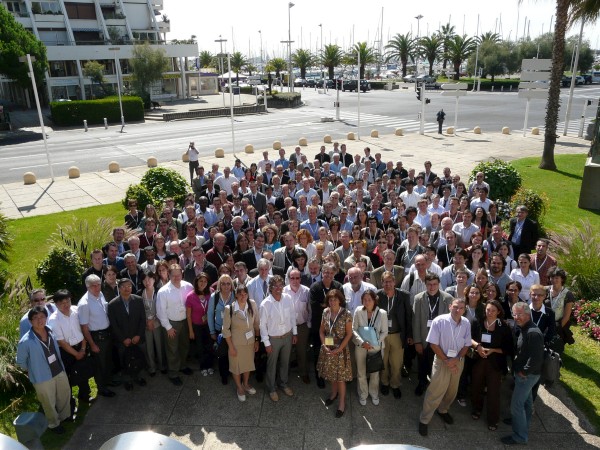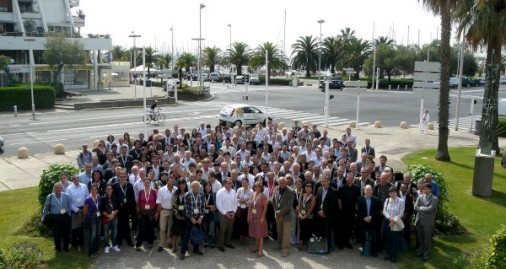The conference is the third in the series initiated by the CARISMA European Coordination Action on Intermediate and high temperature Membrane electrode Assemblies:
1st CARISMA International Conference (www)
La Grande-Motte, France, 21st-24th September 2008.
ca. 200 participants.
Conference photo

Invited speakers
- Giulio Alberti - University of Perugia, Italy
Evolution of the Counter-elasticity of PFSA Membranes when Subjected to Changes of Temperature and/or RH Values and Related Effects on Membrane Degradability
- Brian Benicewicz - University of South Carolina, USA
PBI polymers: An update on structure, durability, and devices
- Gérard Gebel - CEA Grenoble, France
Structure and transport properties in hydrated Nafion membranes
- Andreas Graichen - 3M, Germany
3M's fuel cell and membrane technology
- Klaus-Dieter Kreuer - Max Planck Institute for Solid State Research, Germany
Exploring the application limits of sulfonic acid ionomers for PEM fuel cell applications
- James E. McGrath - Macromolecules and Interfaces Institute, Virginia Tech, USA
Disulfonated Poly(Arylene Ether) Random and Block Copolymers for Polymer Electrolyte Membranes
- Karren More - Oak Ridge National Laboratory, USA
In-Situ Microscopy Characterization of Cathode Catalyst Degradation
- Stephen Paddison - Department of Chemical & Biomolecular Engineering, University of Tennessee, USA
Effects of side chain length and equivalent weight on hydrated morphology and proton diffusion in PFSA membranes
- Bryan Pivovar - National Renewable Energy Laboratory - Hydrogen Technologies and Systems Center, USA
Catalyst Utilization in Polymer Electrolyte Fuel Cells
- Jacques Rozière - Institut Charles Gerhardt - CNRS, France
PBI-type PEMFC blend and interpenetrating network membranes with mixed sulfonic, phosphonic and heterocycle functionalities
- Klaus Schmidt-Rohr - Department of Chemistry, Iowa State University, USA
Elucidation of the Nanostructure of Nafion and Nafion-based Nanocomposites by Small-Angle Scattering Analysis and NMR
- Ulrich Stimming - Department of Physics, Technical University of Munich, Germany
MEAs for direct alcohol fuel cells
- Peter Strasser - Dept. of Chemical and Biomolecular Engineering, University of Houston, USA
Structure, Strain, and Reactivity of de-alloyed Pt core-shell fuel cell electrocatalysts
- Fred Wagner - General Motors, USA
Automotive Challenges and Opportunities for Oxygen Reduction Catalysts
- Masahiro Watanabe - Clean Energy Research Center, University of Yamanashi, Japan
Design of Pt Alloy Electrocatalysts for ORR and Catalysis Studied with in-situ Analysis Tools
2nd CARISMA International Conference (www)
La Grande Motte, France, 19th-22nd Sept. 2010
240 participants
Conference photo

Invited speakers
- Vincenzo Arcella - Solvay-Solexis SpA, Italy
The Solvay-Solexis SSC Ionomer and High Temperature PEM Applications
- Mario Casciola - Università di Perugia, Italy
On the stability of proton conductivity of PEMs at medium temperature and approaches to its enhancement: from thermal treatment to the development of inorganic - organic composite membranes
- Isotta Cerri - Toyota Motor Europe, Belgium
Toyota's Fuel Cell Vehicle: progress and challenges
- Mark Debe - 3M Fuel Cell Components Lab, Minnesota, USA
Nanostructured Thin Film Catalyst Developments at 3M
- Jean-Pol Dodelet - National Insitute for Scientific Research, University of Quebec, Canada
Achievements in Non-noble Metal Eletrocatalysts for O2 Reduction in PEM Fuel Cells
- Michael Eikerling - Simon Fraser University, Canada
Protons and Water in PEM Fuel Cells: Friend and Foe ?
- Andreas Friedrich - German Aerospace Center - DLR, Stuttgart, Germany
Progress in the Understanding of PEFC Degradation Related to Liquid Water Interactions
- Satish Kandlikar - Department of Mechanical Engineering, Rochester Institute of Technology, USA
Water Management in a PEMFC: Water Transport Mechanism and Material Degradation in Gas Diffusion Layers
- Anders Korsgaard - Serenergy A/S, Denmark
Commercial Status and Future Focus Areas of HTPEM MEA Development
- Klaus-Dieter Kreuer - Max-Planck Institute for Solid State Research, Germany
Microstructural Aspects of Ionomer Membranes and their Implications for Transport: Evolution with Time, Temperature and Humidity
- Kenji Miyatake - Clean Energy Research Center, University of Yamanashi, Japan
Novel Hydrocarbon Ionomer Membranes for High Temperature/Low Humidity Operable Fuel Cell
- James E. McGrath - Virginia Tech., USA
Recent Developments in Linear, Postfluorinated and Terminally Crosslinked Hydrophliic-Hydrophobic Multiblock Copolymer Polymer Electrolyte Membranes
- Jon Owejan - General Motors Fuel Cell Laboratory, New York, USA
PEMFC Water Transport and Material Properties Correlated with Neutron Diagnostic Methods
- Dimitrios Papageorgopoulos - Fuel Cell Technologies, U.S. Department of Energy, USA
Overview of the DOE Fuel Cell Technologies Program's Activities - Progress in MEA Component R&D
- Juergen Stumper - AFCC Automotive Fuel Cell Cooperation, Burnaby, Canada
In-situ diagnostic methods for investigating PEFC durability
- Thomas A. Zawodzinski - University of Tennessee, Knoxville and Oak Ridge National Laboratory, USA
New Approaches to Reveal Structures and Processes in Composite Electrodes
3rd CARISMA International Conference (www)
Copenhagen, Denmark, 3rd - 5th Sept. 2012
CARISMA European Coordination Action (www)
The CARISMA Coordination Action of Research on Intermediate and High Temperature Specialized Membrane Electrode Assemblies was operational through 2007 and 2008. The CARISMA partnership assembled the expertise in high temperature PEMFC in European research institutes and universities and included committed stakeholders from SMEs, industrial developers of high temperature MEAs, membranes, catalysts, gas diffusion layers, carbon supports, as well as end users of high temperature MEAs and high temperature stacks. It was endorsed by the International Partnership for Hydrogen and Fuel Cells (IPHE).
The Action was chaired by Deborah Jones (CNRS, France) and 39 partners from 12 European countries were formally participating. Among other things a number of workshops and schools were arranged:
- First Carisma Workshop on "key issues to improve activity and durability of catalysts for PEM fuel cells". Paris, 15 & 16 May 2007.
- Carisma Workshop on "Degradation Issues for MEAS and their components: tools, methodologies and recent results". CEA centre, Grenoble, 05 & 06 July 2007
- Carisma School on "Proton tansport mechanisms", Stuttgart, 8th - 9th November 2007
- Carisma Workshop on "Ionomer Membranes for Medium and High Temperature PEM Fuel Cells", Stuttgart, 12 & 13 November 2007
- Carisma Workshop on "OEM requirements for the ideal fuel cell MEA as compared to the technical state of the art". Volkswagen headquarters, Wolfsburg, 22nd January 2008
The last event of the Coordination Action was First CARISMA International Conference on Progress in MEA components for Medium & High Temperature Polymer Electrolyte Fuel Cells, September 2008.